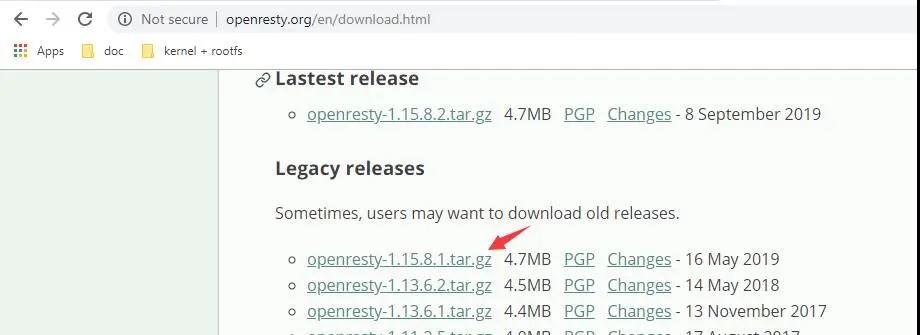如何让多端口网站用一个Nginx进行反向代理实际场景分析
时间:2020-08-31来源:www.pcxitongcheng.com作者:电脑系统城
前段时间公司要整合服务器资源,刚好趁这次机会将这些乱七八糟的服务器做一次梳理和整合,断断续续一个月迁移完成大概优化掉了1/3的机器,完成之后遇到了一些问题,比如曾今零零散散部署在生产上一些可视化UI:apollo,kibana,grafana,jenkins 等等要么采用80端口,要么对公开放了其他端口,为了安全,现在不再开放非80之外的公网端口,由于机器少了,80端口不够,这些可视化UI不再能直接访问到了。所以需另寻其他出路。
一:用nginx做反向代理
为了解决这两个问题,自然第一反应想到的就是使用反向代理,我的理想构思下应该是下图这样的。
既用户所有的请求都经过nginx,让nginx来判断当前url需要跳转到哪一个后端代理上,比较好的策略应该是让nginx来判断当前的host是什么来决定跳转到后端的哪一个webserver上,比如a.mip.com 就跳转到apollo,j.mip.com 就跳转到jenkins. 以此类推,这样就可以完美解决了,是吧?在nginx中你完全可以使用rewrite模块下if指令来进行判断。
二:使用if指令
这里要提一下,nginx比较原始化,如果需使用第三方module,你还需要重新编译nginx,用起来很麻烦,所以这里干脆使用OpenResty,它扩展了nginx,并且集成了很多成熟的lua模块,自行下载最新的1.15.8,安装方式和nginx一模一样。
默认是安装到/usr/local/目录下,当你看到有一个openresty目录表示你安装成功。
- [root@localhost local]# ls
- bin etc games include lib lib64 libexec openresty sbin share src
- [root@localhost local]# pwd
- /usr/local
接下来你可以使用 nginx -v 来看一下openresty版本号啥的。
- [root@localhost sbin]# pwd
- /usr/local/openresty/nginx/sbin
- [root@localhost sbin]#
- [root@localhost sbin]# ./nginx -v
- nginx version: openresty/1.15.8.1
为了方便,我就直接使用nginx开启三个server:
192.168.23.129:80 nginx上开启的第一个网站,就是proxy了。
192.168.23.129:8001 nginx上开启的第二个网站,模拟apollo。
192.168.23.129:8002 nginx上开启的第三个网站,模拟jenkins。
1. apollo的模拟
- server {
- listen 8001;
- server_name somename alias another.alias;
- location / {
- root html;
- index apollo.html;
- }
- }
8001端口网站的默认页是apollo.html,这个apollo.html所在路径就是在nginx下的html目录,如下所示。
- [root@localhost html]# pwd
- /usr/local/openresty/nginx/html
- [root@localhost html]# ls
- 50x.html apollo.html index.html jenkins.html
2. jenkins的模拟
- server {
- listen 8002;
- server_name somename alias another.alias;
- location / {
- root html;
- index jenkins.html;
- }
- }
jenkins.html的文件所在路径如上所示哈。不再赘述。
3. proxy的模拟
- server {
- listen 80;
- server_name localhost;
- location / {
- if ($host = "a.mip.com") {
- proxy_pass http://localhost:8001;
- }
- if ($host = "j.mip.com") {
- proxy_pass http://localhost:8002;
- }
- }
可以看到,只需要使用rewrite模块下的if条件语句,通过$host系统变量判断当前的url中的host的值跳转到相应的网站。
4. host映射
好了,接下来只需要将 a.mip.com 和 j.mip.com 映射到nginx的ip地址192.168.23.129即可。因为这些域名方便记忆而不是真实存在的。
- 192.168.23.129 a.mip.com
- 192.168.23.129 j.mip.com
5. 启动nginx
- [root@localhost sbin]# ./nginx
- [root@localhost sbin]#
- [root@localhost sbin]#
- [root@localhost sbin]# netstat -tlnp
- Active Internet connections (only servers)
- Proto Recv-Q Send-Q Local Address Foreign Address State PID/Program name
- tcp 0 0 0.0.0.0:8001 0.0.0.0:* LISTEN 3802/nginx: master
- tcp 0 0 0.0.0.0:8002 0.0.0.0:* LISTEN 3802/nginx: master
- tcp 0 0 0.0.0.0:80 0.0.0.0:* LISTEN 3802/nginx: master
- tcp 0 0 0.0.0.0:22 0.0.0.0:* LISTEN 1172/sshd
- tcp 0 0 127.0.0.1:25 0.0.0.0:* LISTEN 1724/master
- tcp6 0 0 :::22 :::* LISTEN 1172/sshd
- tcp6 0 0 ::1:25 :::* LISTEN 1724/master
通过上图可以看到,80,8001,8002 端口都已经开启了,接下来大家可以到浏览器去验证一下了。
可以看到这个问题已经很完美的解决了,好了,这就是本篇和大家聊到的实际场景中遇到的一个问题,希望本篇对你有帮助,以下是全部的nginx.conf。
- #user nobody;
- worker_processes 1;
- #error_log logs/error.log;
- #error_log logs/error.log notice;
- #error_log logs/error.log info;
- #pid logs/nginx.pid;
- events {
- worker_connections 1024;
- }
- http {
- include mime.types;
- default_type application/octet-stream;
- log_format main '$host ----> $remote_addr - $remote_user [$time_local] "$request" '
- '$status $body_bytes_sent "$http_referer" '
- '"$http_user_agent" "$http_x_forwarded_for"';
- access_log logs/access.log main;
- sendfile on;
- #tcp_nopush on;
- #keepalive_timeout 0;
- keepalive_timeout 65;
- #gzip on;
- server {
- listen 80;
- server_name localhost;
- #charset koi8-r;
- #access_log logs/host.access.log main;
- # location = /get {
- # set_unescape_uri $key $arg_key; # this requires ngx_set_misc
- # redis2_query get $key;
- # redis2_pass 10.105.13.174:6379;
- # }
- location / {
- if ($host = "a.mip.com") {
- proxy_pass http://localhost:8001;
- }
- if ($host = "j.mip.com") {
- proxy_pass http://localhost:8002;
- }
- root html;
- index index.html index.htm;
- }
- #error_page 404 /404.html;
- # redirect server error pages to the static page /50x.html
- #
- error_page 500 502 503 504 /50x.html;
- location = /50x.html {
- root html;
- }
- # proxy the PHP scripts to Apache listening on 127.0.0.1:80
- #
- #location ~ \.php$ {
- # proxy_pass http://127.0.0.1;
- #}
- # pass the PHP scripts to FastCGI server listening on 127.0.0.1:9000
- #
- #location ~ \.php$ {
- # root html;
- # fastcgi_pass 127.0.0.1:9000;
- # fastcgi_index index.php;
- # fastcgi_param SCRIPT_FILENAME /scripts$fastcgi_script_name;
- # include fastcgi_params;
- #}
- # deny access to .htaccess files, if Apache's document root
- # concurs with nginx's one
- #
- #location ~ /\.ht {
- # deny all;
- #}
- }
- # another virtual host using mix of IP-, name-, and port-based configuration
- #
- server {
- listen 8001;
- server_name somename alias another.alias;
- location / {
- root html;
- index apollo.html;
- }
- }
- server {
- listen 8002;
- server_name somename alias another.alias;
- location / {
- root html;
- index jenkins.html;
- }
- }
- # HTTPS server
- #
- #server {
- # listen 443 ssl;
- # server_name localhost;
- # ssl_certificate cert.pem;
- # ssl_certificate_key cert.key;
- # ssl_session_cache shared:SSL:1m;
- # ssl_session_timeout 5m;
- # ssl_ciphers HIGH:!aNULL:!MD5;
- # ssl_prefer_server_ciphers on;
- # location / {
- # root html;
- # index index.html index.htm;
- # }
- #}
- }
相关信息
-
-
2024-07-07
myeclipse怎么导入tomcat教程 -
2024-07-07
myeclipse如何启动tomcat -
2024-07-07
myeclipse如何绑定tomcat
-
-
Nginx配置-日志格式配置方式
上线了一个小的预约程序,配置通过Nginx进行访问入口,默认的日志是没有请求时间的,因此需要配置一下,将每一次的请求的访问响应时间记录出来,备查与优化使用....
2023-03-17
热门系统总排行
- 4754次 1 雨林木风Win10专业版64位纯净版系统官方下载
- 3784次 2 电脑公司ghost win7 64位纯净专业版v2019.08
- 2502次 3 Win11官方最新版系统下载_Ghost Win11 22000.434(KB5009566)专业免激活版下载
- 2324次 4 深度技术 GHOST WIN10 X64 纯净版 V2019.09(64位)
- 1882次 5 电脑系统城ghost win7 sp132位 经典标准版 V2019.11
- 1794次 6 电脑公司 GHOST XP SP3 安全稳定纯净版 V2019.08
- 1733次 7 电脑公司ghost win7 32位精简旗舰版v2019.08
- 1700次 8 电脑公司 GHOST WIN10 X64 正式专业版 V2019.09(64位)
系统教程栏目
栏目热门教程
- 26513次 1 浏览器控制台报错Failed to load module script:解决方法
- 5534次 2 解决Navicat 连接服务器不成功的问题
- 5314次 3 windows server2012上配置IIS全过程(附详细步骤)
- 3507次 4 Nginx访问本地静态资源详细步骤(推荐)
- 2920次 5 win10系统安装Nginx的详细步骤
- 2857次 6 使用Nginx部署Vue项目全过程及踩坑记录
- 2719次 7 实现远程开机或者唤醒睡眠的电脑的方法
- 2597次 8 系统之家分享windows server 2019 无法安装AMD Radeon RX 6600 XT显卡驱动的解决方法
- 2347次 9 登录远程桌面时遇到“由于客户端检测到一个协议错误(代码0x1104)”
- 2153次 10 Windows Server 2012上安装.NET Framework 3.5提示错误
人气教程排行
- 56679次 1 联想笔记本进入bios的三种方法 联想笔记本怎么进入bios
- 51285次 2 打印机为什么打印出来是黑的_打印出来纸张表面黑的解决方法
- 39166次 3 笔记本电脑序列号在哪|笔记本电脑序列号怎么看
- 32783次 4 对于目标文件系统文件过大无法复制到u盘怎么解决方法
- 31658次 5 键盘全部按键没反应的解决方法 键盘被锁住按什么键恢复
- 30927次 6 键盘win键无效的解决办法 电脑win键失效怎么办?
- 30837次 7 mac连上wifi却上不了网如何解决 网络没问题但mac无法上网怎么办
- 27301次 8 小马激活工具 Win10正版激活 一键完美激活Win10_小编亲测
- 26439次 9 win7旗舰版激活密钥大全
- 25426次 10 电脑免费的加速器有哪些 永久免费的四款加速器推荐
站长推荐
- 12747次 1 Win11怎么激活?Win11系统永久激活方法汇总(附激活码)
- 6277次 2 联想拯救者win10一键恢复如何使用_联想win10一键还原孔使用方法
- 5819次 3 如何用u盘装系统?用系统城U盘启动制作盘安装Win10系统教程
- 5116次 4 怎么在u盘pe下给电脑系统安装ahci驱动
- 4682次 5 联想电脑开机出现PXE-MOF:Exiting Intel PXE ROM怎么解决
- 3948次 6 华硕笔记本bios utility ez mode设置图解以及切换成传统bios界面方法华硕笔记本bios utility ez mode设置图解以及切换成传统bios界面方法
- 3173次 7 win10怎么改为uefi启动_win10系统设置uefi启动模式的方法
- 1926次 8 CentOS 8 系统图形化安装教程(超详细)
- 1876次 9 win10系统下检测不到独立显卡如何解决
- 1850次 10 VMware中安装Linux系统(Redhat8)及虚拟机的网络配置方法
热门系统下载
- 4754次 1 雨林木风Win10专业版64位纯净版系统官方下载
- 4626次 2 Windows Server 2019 官方原版系统64位系统下载
- 4322次 3 网吧游戏专用Win7 Sp1 64位免激活旗舰版 V2021.05
- 4248次 4 Windows Server 2008 简体中文官方原版32位系统下载
- 3944次 5 Windows Server 2008 R2 简体中文官方原版64位系统下载
- 3784次 6 电脑公司ghost win7 64位纯净专业版v2019.08
- 3617次 7 电脑公司ghost win10 64位游戏专用精简网吧版v2020.05
- 3569次 8 Windows Server 2012 R2 官方原版系统64位系统下载





















